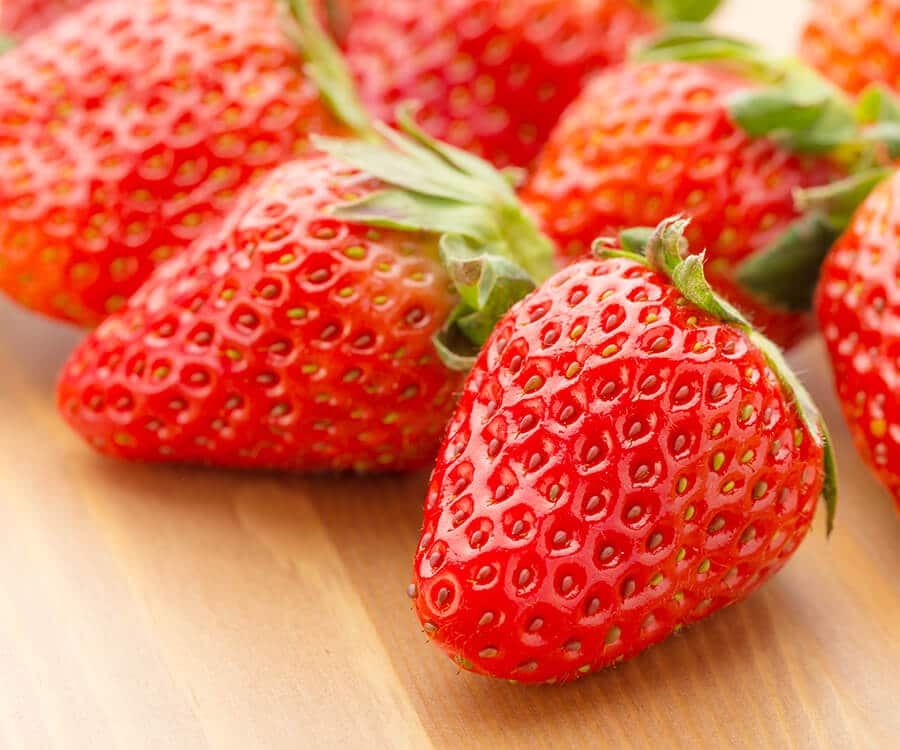Strawberry
Osmotic drying can help to extend the shelf life of strawberries, while also preserving their flavor, texture, and nutritional value.
Osmotically dried Strawberries

Let's list the benefits of dried strawberries and convince you to include them in your menu.

- Strawberries have relatively few calories in one portion (100g) which has only 40 calories. Strawberries are naturally fat-free and cholesterol-free.
- They are low in fiber at about 1g per serving, but their primary macronutrient is carbohydrates at 9g per serving.
- In terms of vitamins and minerals, dehydrated strawberries are a rich source of vitamin C, containing 40% of your daily value in one serving.
- Strawberries can lower bad cholesterol. Strawberries contain ellagic acid and flavonoids that can reduce the level of bad cholesterol in the blood. Researchers from Toronto studied strawberries and found that they played an important role in lowering cholesterol levels, especially when combined with an overall healthy diet and exercise.

- They’re full of flavor, and dried strawberries are a great way to satisfy your sweet tooth without adding sugar or a lot of extra calories to your diet. The next time you feel the urge to reach for the candy bar, try snacking on dried strawberries instead!
- High in vitamin C (immune boost!) Strawberries are a rich source of vitamin C with just one serving providing 40% of your daily intake. The good news is that vitamin C also contributes to a healthy immune system. There’s a reason so many people take vitamin C during cold and flu season.
- They are rich in anti-inflammatory antioxidants. The antioxidants and phytochemical compounds found in strawberries play an important role in reducing inflammation. One study found that women who ate just 16 strawberries per week had a 14% reduction in inflammatory markers when tested.

- They support healthy bowel habits. Adding strawberries to your cereal in the morning is a great way to maintain good digestion.
- Strawberries provide a tasty source of minerals such as manganese and potassium. Both minerals play an essential role in regulating normal cellular function in your body.
- They improve the work of the heart. Maintaining heart health involves eating a diet rich in fiber, antioxidants, and phytonutrients, and small strawberries have all of that in it.They improve the work of the heart. Maintaining heart health involves eating a diet rich in fiber, antioxidants, and phytonutrients, and small strawberries have all of that in it.
If we think about where and how we can use strawberries, it would look like this. As we mentioned above, a great way to get them into your diet is by adding a serving of cereal every morning. They are rich in nutrients and quite low in calories, but they also contribute to the feeling of satiety. Because they have a good, but also mild taste, they are an excellent choice for adding to oatmeal or yogurt.
Strawberries are high in fiber, so they’ll keep you going until lunch. Strawberries can also help prevent unhealthy snacking between meals, as a super snack. They are also a good choice when cooking and preparing various dishes. You can add them to muffins, bread, cookies, cake toppings, and more. Strawberries pair well with citrus dishes and chocolate, so consider getting creative with how you use them. You can mix strawberries into yogurt, smoothies, milk and more.
If you exercise, consider having them before or after your workout. It might be a good idea to have them both times for maximum benefit. Because they are a good source of carbohydrates that can fuel your training, giving you energy. After you finish your workout, enjoy some fruit to replenish your energy stores. Strawberries are also a good choice for breakfast food. Every time you get sick or are recovering from an illness, include dried strawberries in your diet.